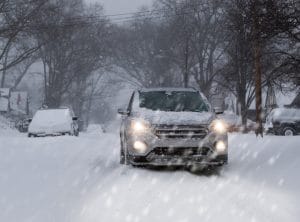Stay Safe During Winter Storms
 This December, North Carolina was hit by an early winter storm that dropped over a foot of snow on the state. While gently falling snow is pretty to see, winter storms like the one we suffered recently can cause many types of accidents, including car crashes and slips and falls. Cold weather snaps, hail, snow, and ice create unique types of problems. In combination, they can cause disaster.
This December, North Carolina was hit by an early winter storm that dropped over a foot of snow on the state. While gently falling snow is pretty to see, winter storms like the one we suffered recently can cause many types of accidents, including car crashes and slips and falls. Cold weather snaps, hail, snow, and ice create unique types of problems. In combination, they can cause disaster.
Common kinds of cold-weather accidents
Typical accidents that happen in cold weather include:
- Vehicle crashes. Snow and ice create two types of difficulties for drivers. Each type can cause a driver to lose control of the vehicle. First, snow and ice make visibility much more difficult. Even at low speeds, it can be very tough to see. If there is ice or hail, the windshield wipers may not work at all. Second, when it snows, cars can easily lose traction with the ground. Many North Carolina drivers don’t have snow tires or chains that can help with traction. Drivers can be negligent for the accidents they cause in winter if they fail to:
- Use caution while driving in bad weather. Speeding on icy roads is a recipe for disaster. So is driving while distracted.
- Leave safe stopping distances. Cars, trucks, and other vehicles need much more time to stop in the winter weather. If a driver is tailgating, he or she may not have time to stop before crashing into the vehicle in front of him/her.
- Use winter driving techniques. This can include driving in a lower gear, putting your headlights on, or using your four-way blinkers if you plan to go slowly.
When driving in the snow and ice, drivers should use precautions such as having a shovel in the car, booster cables, sand, a fully-charged cellphone, and a tow rope. Make sure to fill your tank, too. Driving in the cold is no time to run out of gas, and you don’t want to get stranded.
- Slips and falls. Property owners, including homeowners, have a duty to clean their sidewalks, walkways and parking lots so visitors don’t break suffer serious harm by slipping on the ice or uneven surfaces. “Black ice,” a thin layer of ice on cold roads and sidewalks, is especially treacherous.
- CO poisoning. If a generator is used to warm the house or garage, it can leak deadly carbon monoxide. Never put a generator inside your home, because lack of ventilation can kill. Make sure you have a carbon monoxide detector, too, and that it is in good working order.
- Electric shock if power lines go down. Downed power lines are dangerous, and if a storm is severe enough, it can take hours or even days before an emergency crew can fix them. Property owners need to contact the local electric company or local officials if they have downed power lines. The owners also need to have proper warnings that lines are down and may be deadly.
- Overexertion injuries. We know that you want to get the snow off your driveway as quickly as possible – but now is heavier than you think. Every year, people injure themselves by trying to lift shovelfuls of snow and ice that are simply too heavily to lift.
Cold weather injuries include broken bones, herniated discs, head trauma, and other injuries which may be permanent. Hypothermia is common, and we have already had three deaths related to this most recent storm.
We want you to be safe and sound this winter, but if you are injured, Warren & Kallianos, PLLC may be able to help. Contact our Charlotte injury lawyers by calling 704-377-7777, or by using our contact form today. We serve clients throughout North Carolina.

At Warren & Kallianos, we believe in the importance of working directly with our attorneys, Jeff Warren and Chris Kallianos. When you work with our firm, Jeff and Chris are always accessible to you throughout the progress of your case.
Read more about Warren & Kallianos, PLLC
